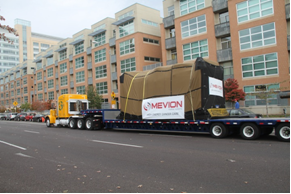It’s probably the biggest medical device made in MetroWest.
Measuring about six feet in diameter and 20 feet in length, the proton accelerator made by Mevion Medical Systems in Littleton is so large that it required a wide-load truck to deliver the first shipment of the product to a hospital in St. Louis.
And the delivery of the cancer therapy system also marks a new era for this company – formerly Still River Systems -one that could mean not only growth for this manufacturer, but promising new treatment opportunities for cancer patients.
Life Saving Opportunities
Mevion Medical Systems, a 95-person research development, manufacturing and now sales firm in Littleton, has been around for about 10 years. The shipment of the Mevion S250 is the first of the company’s products to hit the market, said Lionel Bouchet, senior director of product management.
Each year there are about 1.4 million new cases of cancer diagnosed in the United States. About 60 percent of those are treated using radiation therapy, which are basically high-powered X-rays that are zapped at the cancer site, killing cancer cells but sometimes also damaging healthy tissue nearby.
Mevion’s product could be a game changer in this market, Bouchet said.
The Mevion proton accelerator uses a dense beam of protons to shoot and kill the cancerous cells. It’s much stronger than X-ray treatment and can be directed at specific areas with a high degree of accuracy, reducing the risk of healthy cells being damaged during treatment.
The therapy is ideal for pediatric patients who could be severely damaged by being exposed to unnecessary treatments, and treatments for certain types of brain cancers where it is extraordinarily important not to damage healthy tissue.
Proton therapy is not new to medicine, but the first machines literally took up the better part of a building and weighed up to 700 tons. By the early 2000s, the systems were reduced to about 250 tons. Mevion’s accelerator is less than 20 tons.
“It’s a very drastic reduction in size and weight,” Bouchet said. “This ultimately can lead to less- expensive manufacturing and installation costs.”
As of now, however, the systems are not cheap. One could set back a hospital or treatment center about $25 million and about 2,000 square feet of dedicated space is needed to house the system.
A number of clients have already jumped onboard, though.
The first Mevion S250 was placed on a truck and made the 1,200-mile, four-day trek to St. Louis, where it is being installed at the Barnes Jewish Hospital/Washington University School of Medicine.
Two other installations are expected to be complete in New Jersey and Oklahoma in the next 18 months, Bouchet said.
Beyond that, research and development continues in Littleton, where Mevion officials plan to further improve the system by reducing its size and weight, thereby making it available for even more patients. Despite the system’s high cost, Bouchet said it prevents further complications and can reduce the number of treatments a patient needs.
And for some patients, especially the younger ones, that can be a life-saving opportunity.

